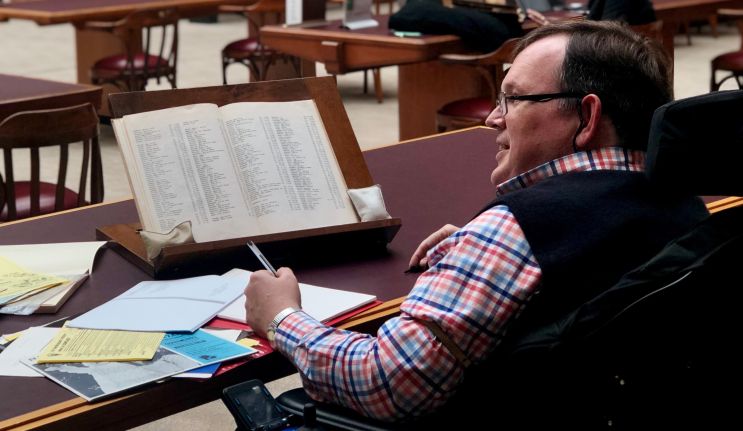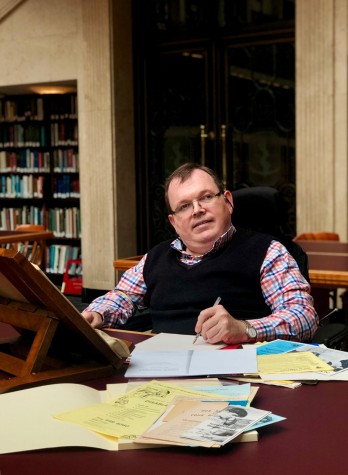
ALUMNI FOCUS
Adam Johnston – dreaming big
Alumnus Adam Johnston is an MQ law graduate and now PhD student. He was born with cerebral palsy and has spent his life in a wheelchair, but that is not what will define him. Investigating the NDIS (National Disability Insurance Scheme) so others with disability may live a better life is his work; leaving a bequest to MQ research so that others may lead a life free from physical disability is his dream.
Few people have the clarity and courage to step back from their life to see it as it truly is. Even fewer have the tenacity and intelligence to challenge the way things have always been; to stand outside the social constructs that define their world and envisage a better one. Adam Johnston is one such person.
Born in the early 1970s, Adam recalls: ‘I was born three months premature and wasn’t expected to survive, but a humidicrib and some inspired 1970s intensive care treatment at Manly Hospital saw me through.’
Diagnosed with cerebral palsy, which he explains is when a lack of oxygen, either in utero or at birth, affects various brain centres, he says: ‘In my case, it affects my legs; my ability to walk and move around.’
In a wheelchair ever since, and subject to numerous interventions that he says were of dubious merit and much suffering, Adam credits his mother for his tenacity: ‘She never gave up on me. Even with advice to the contrary, which was typical of the time, she continued to care for me and search for the best outcomes for me and my health.’
There is also the no small matter of a dream his maternal grandmother had. A woman who had seen much of life already – world wars; the loss of her husband. She had also seen the invention of radio and television, a man land on the moon and the development of computers – and fervently believed Adam had been born into precisely the right time in history. A time she believed would have the scientific and technological advancements required to help Adam walk free from impediment.
Adam remembers, ‘She used to tell me about a dream she kept having during the difficult months after my birth, where the two of us were walking along the Manly Corso, a humidicrib alarm light flashing above my head.’
Yet dreams are nothing without action to underpin them, and this is where Adam is slowly but surely heading. With a keen intelligence and an interest in politics, economics and law, he graduated from Macquarie University in 2005 with a BA/LLB and is currently undertaking a PhD. He has also worked part-time for many years in policy review for his local district health service and is currently with the mental health, drug and alcohol team.
As he recounts his early student life and the workarounds needed to achieve things other students take for granted – such as physically accessing lectures and organising interstate student exchanges – it is clear this intellectual acuity, and the insight it allows, can be both a blessing and a challenge.
Yet there is no bitterness for the cards he has been handed, just a gentle humour and a dogged determination to use this gift to affect real change. Based on a life’s worth of experience navigating disability services in Australia, he chose to undertake the PhD because, quite simply: ‘The NDIS needs to be confronted,’ he wrote in a conference paper in 2019. ‘It assumes lifelong disability and makes its plans from this starting position.
And this is where Adam really begins to shake up the accepted thoughts on disability. ‘Why are we not alleviating the pain and suffering of those with disability? Isn’t it better to fix the problem?’ he asks, of a conundrum that has been a motif throughout his life.
As a young man finishing school, he remembers, ‘I had several friends with degenerative diseases, such as muscular dystrophy and MS, and by the time I was 18 I’d been to five or six funerals. That leaves an impression on you. You think, How can this happen? Is this all there is?
‘There was no clear answer; it was just the way things were,’ says Adam. ‘I just had to accept that I was disabled and make the best of it. But after multiple orthopaedic procedures to make me more mobile, which in my case didn’t work, and a constant rehab program, I began to think, Is this all I will do? Where is all this going?’
But it was a keynote address by the world-famous paralysed actor Christopher Reeve at the then-premier Bob Carr’s forum on spinal cord injury and conditions in Sydney in 2003 that turned this around for Adam.
‘I was listening to Reeve and his doctor speak about the new wave of medicine that would be regenerative medicine; stem cell technology. That was the point at which I said to myself: I don’t have to be a disabled man anymore. I could see a future where I was among the last to experience physical or intellectual disability.
‘The real solution, however, will be a combination of stem cell therapies and the capacity to regenerate body parts. This can already be done on a micro level; they can already grow a miniature heart or a tiny lung. The question is how to upscale this for humans, but we are getting there,’ says Adam.
In combination with the ability to alter genes, Adam believes there is cause for hope. ‘A lot of diseases like MS and muscular dystrophy – and even cerebral palsy, which has some genetic markers – might be solved by looking at the genes that are either active or recessive. If you can shut those genes off, you can save a whole life of suffering.’
The kind of suffering Adam knows intimately – and isn’t afraid to confront or advocate on, appearing in front of the Productivity Commission twice to ask them to fund and support science and technology that will cure disability. ‘I’ve always been someone who’s pushed against the tide,’ he says, determined not to take no for an answer.
And so, what led him to choose Macquarie as the recipient of his bequest? ‘I have a long association with Macquarie as a student, and the university has invested in me over the years; I am grateful to be the recipient of a Higher Degree Research (HDR) scholarship and part of the mentor network.
‘Importantly, I wanted the bequest to directly support scientific research for medical intervention, so needed an institution that had longevity and didn’t rely on a three-year funding cycle.’
It’s all about the long game for Adam, who says his decision to leave a bequest to the university was one that developed over time, with a lot of thought. ‘I don’t have any children, and I’m not married. I am a disabled man. There comes a time in your life when you ask, What will be my legacy? What will survive me?
‘I need to be pragmatic and want to support the next generation of researchers so they can progress their work to a point where it can be clinically applied, and people like me can walk,’ he says.
Again, there’s the characteristic magnanimity and a complete lack of rancour to his words. No less, there’s the touch of fond regard for those researchers and organisations already on this quest who, for Adam, ‘make life worth living’ and give him the confidence that while some dreams may not be realised, higher ideals are possible.
Indeed, when speaking with Adam, we are reminded that the greatest courage may just be accepting which of our dreams will not come to fruition; the greatest sacrifice the selflessness to believe that through our actions, others might still achieve our dream.
Words: Megan English
If you would like a confidential discussion about leaving a gift in your will and/or lifetime giving, please call the Office of Advancement on (02) 9850 4278 or email mqadvancement@mq.edu.au.
